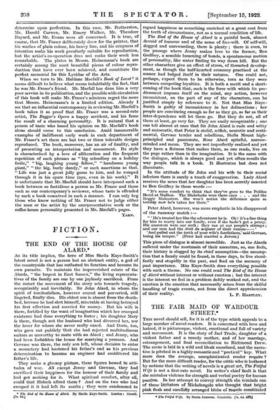FICTION.
THE END OF THE HOUSE OF ALARD.*
As its title implies, the hero of Miss Sheila Kaye-Smith's latest novel is not a person but an abstract entity, a god of the countryside that has outlasted its function and become its own parasite. To maintain the impoverished estate of the Alards, "the largest in East Sussex," the living representa- tives of the family are one by one joylessly sacrificed. From the outset the movement of the story sets towards tragedy, recognizably and inevitably. Sir Jahn Alard, in whom the spirit of territorialism, however soured and perverted., still lingered, finally dies. His eldest sun is absent from-the death- bed, because he had shot himself, miserable at having betrayed his first affection and married for money. But his wife is there, fortified by the want of imagination which her cramped existence had done everything to foster ; his daughter Mary- is there, though not the husband who had divorced her, nor the lover for whom she never really cared. And Doris, too, who gave out publicly "that she had rejected multitudinous suitors as umi orthy to matt with an Alard ; and Jenny, who had been forbidden the house for marrying a yeoman. And Gervase was there, the only son left, whose decision to enter a monastery had hastened his father's end as his previous determination to become an engineer had embittered his father's life.
They make a gloomy picture, these figtires bowed in atti- tudes of woe. All except Jenny and Gervase, they had sacrificed their happiness for the honour of their family and had got nothing for it. What spiritual comfort, after all, could that Moloch afford them ? And on the two who had escaped it it had left its marks ; -they were condemned to • _Vas Bed of tho 'Howe of 4104 By"Shella Raye-SmIth. - London : Cassell. 172, 6d4 regard happiness as something snatched at a great cost from the teeth of circumstance, not as a normal condition oflife.
The End of the House of Alard is a painful book, almost devoid of humour and of the sense of five-will. Of self-will, dogged and unrewarding, there is plenty ; there is even, in the passage where Jenny makes love to the farmer, Ben Godfrey, a sensible loosening of bonds, a spontaneous motion Of personality, like water finding its way down hill. But the other characters give an effect of stress, of thwarted develop-, meat, as though the half-hearted economy practised at the manor had lodged itself in their natives. One could not, perhaps, expect them to- be otherwise, torn as they were between competing loyalties. It is both a merit and a short- coming of the book that, such is the ibree with which its pre,- dicament imposes itself on the mind, any action, however inconsistent, on the part of any of the characters, can be justified simply by reference to it. Not that Miss Kaye- Smith is guilty of inconsistency in her delineations ; her people are convincing enough as far as they go, as far as their interdependence will let them go. But they do not, all of them at least, go very far. They are easily recognizable ; one can tell almost at once that Sir John Alard is r5ude and witty and autocratic, that Peter is stolid, selfish, neurotic and senti- mental, Gervase tender and rebellious, Stella Mount high. principled and passionate, Rose Alard spiteibl, narrow- minded and mean. They are not imperfectly realized and yet they have a flatness that makes them, as one reads, live on the page rather than in the imagination. It is the same with the dialogue, which is always good and yet often recalls the way people talk in a book. It illustrates but does not In the attitude of Sir John and his wife to their social inferiors there is surely a touch of exaggeration. Lady Alard receives the news that her daughter has been secretly married to Ben Godfrey in these words :— " some comfort to think that they've gone to the Poldhu Hotel at Mullion. The Blakelooks were there once . . . and the Reggie Muleasters. She won't notice the difference quite so terribly now he's- taken her there."
Peter Alard, however, was more emphatic in his disapproval of the runaway match :— "'He's treated-her-like the adventurer he is Oh-! it's a fine thing for him to marry into our family, even if she hadn't got a penny. His ancestors were our serfs • they ran at our peoples stirrups ; and our men had the droit dig seigneur of their women-- ' 'And pulled out the teeth of your wife's forefathers,' said Gervase, losing his temper." (Peter bad married a Jewess.) This piece of dialogue it almost incredible. Just as the Alards suffered under the mortmain of their aneestom, so, one feels, their history is clogged by its Chief assumption—the assump- tion that a family could be found, in these days, to live stead- fastly and stupidly in the past, and feed on the memory of past importance. Miss Kaye-Smith does everything, possible with such a theme. No one could read The End of the House of Alard without interest or without emotion ; but the interest is the interest we feel in a problem deftly worked out, and the emotion is the emotion that necessarily arises from the skilful handling of tragic events, not from the direct apprehension


































 Previous page
Previous page